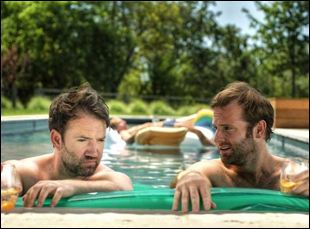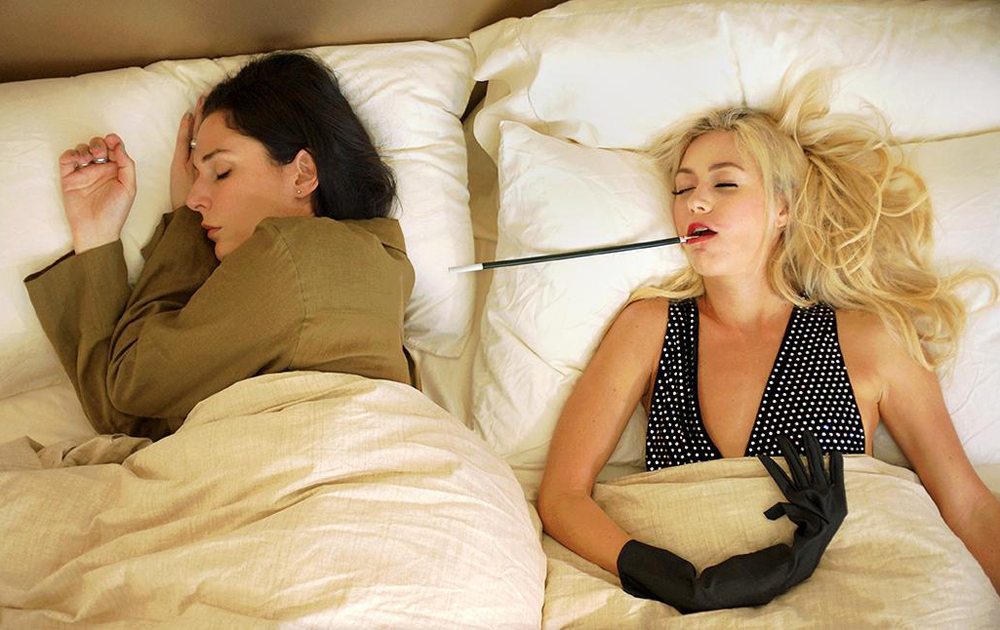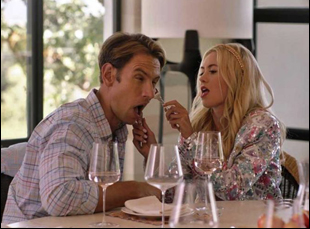Kestrin Pantera is always open to an unusual invitation. In fact, the filmmaker planted high heels all around Austin with a QR code below in advance of the world premiere of her latest comedy “Pretty Problems” at SXSW that, if scanned, would give the skinny on how to get into the afterparty. So she threw caution to the wind upon receiving a random e-mail from Britt Rentschler with the proposal of a fully-financed film with its cast mostly already assembled – Rentschler and actor/writer Michael Tennant were planning to enlist many of their actor pals – and an amazing location in a vineyard owned by a billionaire in Sonoma.
“You get that e-mail, you read that script,” says Pantera, who not only couldn’t believe such a project landed in her lap, but that she was rewarded quite handsomely for her curiosity when the script actually turned out to be really good.
Still, it was ironic that “Pretty Problems” serves as a bit of a cautionary tale against accepting such offers without thinking them through, as is the case with Jack (Tennant) and Lindsay (Rentschler), a longtime couple that appears to have lost the spark in their relationship and seem to be treading water professionally. They receive a jolt on both fronts when Cat (J.J. Nolan) walks into Lindsay’s consignment clothing store and offers to buy up every dress in her size, with plans to take Cat along with her up to wine country for the weekend with her husband Matt (Graham Outerbridge). If the summons seems too good to be true, Jack and Lindsay quickly find out that it likely is when they’re introduced to another couple, Carrie (Charlotte Ubben) and Kerry (Alex Klein), they didn’t know were coming and that it’s Cat’s birthday, making it a strange situation when they’ve only just met.
Any thought the grass is greener on the other side of the fence as Jack and Lindsay are escorted around wealth they can hardly fathom – well, it might literally be greener, given the proper care by a well-paid staff, but the two quickly realize that money can become a means of hiding issues they have rather than addressing them and amidst karaoke and murder mystery games, the couples may all be having fun, but none are happy. Yet their misery becomes wickedly funny in Pantera’s follow-up to her well-received 2019 comedy “Mother’s Little Helpers,” working from a script by Tennant that is emotionally attuned as it is to finding humor in the obliviously wealthy milieu, and just as the director was able to forge what seemed like real family ties on her set for the tale of a dying mom, the dynamics between the friends and lovers in “Pretty Problems” all feel authentic no matter how outrageous the comedy gets.
In the midst of South By Southwest, Pantera, Rentschler and Tennant generously took the time to talk about collaborating on the comedy, having the run of a billionaire compound for a three-week shoot and the cat that pulled the production together.
Kestrin Pantera: Well, Britt Rentschler is a witch. [laughs] I received an e-mail from an anonymous stranger off the internet who said, “I have a hilarious movie. It’s fully financed. We saw ‘Mother’s Little Helpers,’ and we love it. We’re actors, and we want to have performances like that film. Here’s pictures of our location, it’s an amazing billionaire compound in Sonoma. Do you want to read the script?” You get that e-mail, you read that script. And then I met them, and Michael wrote the script with story by Britt.
Michael, how did you first put pen to paper for this?
Michael Tennant: I was actually here [at SXSW] in 2018 and I saw Mark Duplass give the “The cavalry isn’t coming” speech again, and I went, “Oh shit, the cavalry isn’t coming.” And Britt is one of my oldest friends and I love comedy, but the joke is that I like to make stuff my therapist is going to like, so I want to make stuff that makes people laugh but also hurts. My wife and I split up shortly after shooting, and a lot of the script’s based on just me being in a marriage and being like, “Is this it?” I was talking to a lot of my friends who were having the same experience of, “I guess we’re here, and this is what we’re doing,” so my goal was to tell something that gets you here, but also just makes you laugh and Britt was an amazing partner, collaborating with me all through that entire writing process.
Britt Rentschler: Michael and I have known each other for a long time, and we both were in the early parts of our career, struggling, kicking and screaming, trying to do the best we could. We had horrible relationships in our twenties with reckless, wonderful fun people. Then we met our partners, got married, and saw ourselves through all of that and hit this moment [where] we were like, “Oh, hi, what’s next?” And what was really unique about this is we were set to shoot, and then COVID shut down everything, so we had another year to percolate ideas and to strip things down. The longer we spent in isolation, the deeper the threads of the movie got, exploring what is it like looking at all these people on social media, comparing your lives to them and wanting something more, and feeling completely trapped.
It actually seems like an ideal shoot because you’re going to the middle of nowhere for this. What was it like to have this location?
Michael Tennant: [It came courtesy of] a family friend who was traveling in Europe for three weeks. We literally had three weeks on Broadway to shoot, so we knew exactly how many days we had.
Kestrin Pantera: And the experience when you go to a billionaire compound, which I hadn’t been to before, is [that] you think you’ll feel all these feelings, but what you really feel is, “Oh my God, someone made life decisions that resulted in them owning this property and I already didn’t do that, so I have fucked up my life.” It brought this existential ennui, and everyone had that experience in the first 24 hours. Then 12 hours later, you’re like, “God, this fucking doorknob keeps falling off” and you bounce into this entitlement where you just see all the cracks and stuff that’s broken. It’s a parallel for the film where it’s all the illusions of grandeur [and] ultimately, there is just a bunch of broken shit inside of it, but it is our lives that we’re stuck alone with and must deal with.
When you were writing the script, did you build activities around the location?
Michael Tennant: This was very strategic. I’d been to the property before and had the exact same reaction where you show up and you go, “Oh, fuck my life. I thought I was doing okay, and I am not doing okay,” which is such a big part of Jack and Lindsay’s journeys. They’re actually doing fine. They’ve decided that they haven’t hit their potential, and when I went [with the film in mind], I photographed the entire property, and then I sat down and — this was the Duplass brother brain thing — [thought], “I’ve got this room. What can I set in this room? I’ve got this extra house. What can we do down here?” And Britt came up with so many fun ideas, like the murder mystery night and all these other fun things where it’s [these] things you do tocreate drama amongst small friend groups.
Britt Rentschler: Yeah, the cacao ceremony was born out of [being at the point] we’ve had so much conflict, how do we bring people back together, but still keep it very funny and also very of this world where you have a personal shaman on call? We explored that. It was a really fun seesaw of the dynamic tension between all of those moments.
Kestrin Pantera: And all my actors like talk about how collaborative we are, and [when] I got this script, it was 90% perfect, but I found this 10% gap where I’m like, “How do we figure this out?” I always feel like a jerk saying, “I don’t like something that you wrote.” I usually get really scared of saying that.” You don’t say, “this sucks.” You say, “How about we do an alternate storyline? Let’s investigate a little further.” And that [still] was a scary thing to say, but the COVID year gap that we had was how we ended up getting that character Big Dick Dan, which is among my favorite storylines and was it was [asking] could we try an alternate version of some of these jokes? Michael called me in the middle of the night [once] and was like, “I thought of this guy, Big Dick Dan.” It gave us opportunity to improve.
Britt Rentschler: We had about seven or eight extraneous characters that now due to COVID, we needed to [eliminate to] keep our shoot as small as possible. [So we wondered] how do we solve this problem creatively? then we come up with this character, a concentrated version [of other characters connecting Dan and Becca] and one of our favorite jokes, as I’m sure you could tell.

Michael Tennant: Most of the actors were sourced from our acting studio, John Roosevelt Studios where Britt and I met. I was sitting at my birthday dinner in 2019, and I’d already written the outline, but I hadn’t showed it to Britt yet, and I thought looking around this table, “What if I just went and made a movie with these people, my friends who I know won’t let me fail, and who will pick me up on the days that I’m too tired and will really support me through this?” Then we brought Kestrin on board, and Kestrin brought in J.J. Nolan, who I’d been class with a couple years ago and was one of my favorite people to work with, to read for the role of Carrie. And actually, Charlotte Ubben was going to play Cat and J.J. came in and crushed the audition to the point that Charlotte turned to me and said, “Fuck that, I’m playing Carrie.” [laughs]
Kestrin Pantera: I knew J.J. was going to play Cat from the very beginning. When we saw the movie, Charlotte was vacillating between roles. And I was like, I’m going to call J.J. Nolan. I know exactly what’s going to happen.
Michael Tennant: [Kestrin] also brought in Vanessa Chester to play Gigi, who showed up on set when we were about a week in, all getting a little tired and it was just like an espresso shot.
Britt Rentschler: I called Vanessa our B12 shot. But Michael came to me with 10 pages written, and he is like, “Listen, I’m terrified to show you this, but I just read Brene Brown for the second time, and I’m going to be vulnerable.” And he sent it to me, and in 10 pages, he managed to get the crux of the relationship, the failing parts of their marriage and got them to the chateau and now we’re at the place where all hell can break loose. So I called him immediately, like “I’m coming to your house right now, get a bottle of wine. Let’s talk about everything.” And then Kestrin came in and was a structural witch, knowing exactly where we wanted to tighten up some things and there was a lot of late night open Google docs, pitching jokes to each other — I think Michael and I came up with like 25 alts to the song lyrics that the shaman could be presenting. It was really fun.
Michael Tennant: And I love what Kestrin said [about the 10% gap]. Because what I loved about “Mother’s Little Helpers” was she just nailed the end. and I did feel really good about 80-90% of the script, but I was like, I know the ending isn’t there yet.
Kestrin Pantera: He’s so sweet. And you always feel like a jerk pointing out where you want to encourage. And that’s one thing that I really learned on this movie was being supportive while getting what you want, which is like, “We’re going to rewrite the ending, but we’re not going to poke your soul and hurt you when we do it.” This is a breakthrough that I had in my life that collaboration is the ability to point out the flaws and say why you don’t like something so that we can work together to find solutions. That was a big learning point. My friend who directed a big movie was like, “No, no, no, you try to get to the point where you distill it down to what everyone hates as quickly and specifically as possible, so that you have these smart people all work together to fix it.” And Michael and Britt were the best team in the entire world to enlist in making repairs.
Britt Rentschler: The first thing that Kestrin did get was a version that we had settled on, and then we did a table read, and we let our friends, not us, read all of our parts, and we recorded it. And we were like, “Oh my God, this is not working.” And some things were popping and some jokes were funny, but some things weren’t, so you just get in there and massage and change and pitch. You have to really trust each other. And Michael and I had a decades’ long trust, but then Kestrin came in and immediately was someone who had this abundance of enthusiasm and such a genius brain about it that we felt like we could trust her right away.
Was there a particularly crazy day of shooting?
Kestrin Pantera: Ask [Michael], he who cries in the shower. [laughs] We had a really tight schedule, and we were cross-shooting all of our scenes so that when we riffed at the end after shooting it word perfect from the script and it was really important to shoot both of the actors’ closeups at the same time, so it would edit together well. And one day, one of the cameras shit the bed on the first week of filming, and we had to get another one, but it was Friday at the end of the day. We were two hours outside of San Francisco and 10 hours from LA and we [thought], “We’ve got to get a camera as soon as possible.”
Britt Rentschler: We ended up getting a camera for one day from San Francisco while someone else got on an airplane and flew up and brought us the camera, so that we could switch it out because of course that one camera that one day in San Francisco was more expensive than everything we had planned.
Michael Tennant: It was great. We were shooting a scene, and we could kind of feel the crew getting a little weird and [wondering] what the hell is going on. We looked back, and they’re trying to pry a memory card out of the camera and it was stuck. And our producer Katya just [said], all right, we’ve got one driven up from Berkeley and then got a friend of hers from film school to COVID test, jump on a plane with a new camera, so we had a camera the next day. It was insane.
What’s life like on a set like this where I imagine there isn’t much difference between being the time you’re on set and the off-hours?
Kestrin Pantera: It was community, which was something that we had been seriously lacking, all of us in a time of isolation. Not only did we get to make this film together, but we had protocols in place from the union, so everyone was tested, and we finally could just be a room with people and sit and talk, and it really enriched the experience of what you see on screen, that real desire to try to throw yourself out of your life and be in a new place. It was very palpable.
Michael Tennant: It was summer camp, [which] Charlotte and I, when we put this movie together, initially I said, I want this to feel like [that]. Most of the indie movies I’ve been fortunate enough to produce, that’s always the vibe I get. You go to camp and I don’t know who I’m going to be friends with. I don’t know who I’m going to fall in love with. It was so fun. We busted our asses for 12 hours, and then we just got to hang out and we had dinner together every night. We probably had a little too much wine. Kestrin went to this kick ass karaoke bar on our days off.
Kestrin Pantera: One fun [thing] that happened [was after] I left [to shoot the film], my husband called and [said], “I’m really sorry to let you know your cat’s dying,” and I was like, “The cat’s a year old. The cat’s not fucking dying. She just hates you.” [laughs] But he was like, “No, it’s really dying.” So I had a friend of mine fly the cat to set, and [in fact] the cat was not dying if he could smile like that. And all of our camera crew are crazy cat people, so she became this totem for everyone. It really raised the morale. It was also part of the quarantine pod. Everyone would come and hang out in my bathroom with this cat.
Michael Tennant: She’s actually here right now [in Austin].
Britt Rentschler: Kestrin showed up to the airport, gets out of an Uber, and she’s got Keka in her little carrying case. And we were like, “Let’s go.”
Kestrin Pantera: I’m just saying this because I want to direct the live-action reboot of “The Aristocats.”
Well, let’s make that happen. What’s it like for the rest of you to be here in Austin?
Michael Tennant: It’s honestly the biggest honor of my life. This was the festival that inspired this movie and I knew I wanted this movie to premiere here. I spent so much time, and we all did busting our asses to be able to make the deadline for this festival specifically and I literally signed divorce papers that morning and then got the call from Kestrin that night that we got in. It was one of the strangest and most exciting days of my entire life.
Britt Rentschler: There was this thing that I did 10 years ago when I moved to LA. I made this list [when] I got to the city, and I felt so small. I didn’t know what I was doing or where I was going, but I thought, I’m just going to make this list of 10 things that I really want to do hopefully in the next 10 years and we’ll see how it goes. One of them was, I want to be in a movie at South by Southwest that I produced, wrote and starred in. That was the one that I was sure would was never going to happen at that point in my life, so this is a huge full circle moment to be here and to not even know who it would be with and to have it be such a pipe dream at the time, it’s an honor.
“Pretty Problems” opens in theaters and on demand on October 7th.





